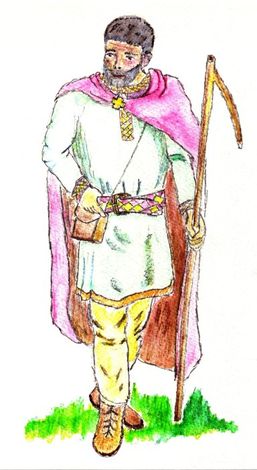I'm delighted. My book based on the life of St Patrick has been accepted by my publisher IndieGo Publishing. It will, I hope, be available in print and as an ebook later this year, but it will, at last, appear in print. To be titled Magnus Patricius, I have based it on his own biographic account contained in his 'Confessio' - one of the two documents we can authenticate as being written by him. Forget the legends, the man hiding behind them is far, far more interesting and, dare I say it, even more remarkable than any legend could possibly make him.
His real name is Magnus Succatus Patricius, in the Roman fashion, his 'surname' was Succatus and his 'given' name Magnus or Magonus. Patricius is a nickname - a 'cognomen' - usually implying the opposite of the word's usual meaning. An example is Caesar, which meant 'hairy' and Gaius Julius (Caesar) was rather famously bald from an early age. So Magnus Succatus probably earned his 'Patricius' by being everything a Patrician wasn't. Thanks to the survival of his Letter to the Soldiers of Coroticus ( a 'king' celebrated in the song "The Court of King Caracticus"), a Pictish 'King' based in North Wales, Cheshire and Cumbria in the fifth Century we have a firtst hand account -- a window -- into what was happening in Post Roman Britain. From other sources we also know that Coroticus was hiring Angle and Saxon mercenaries in his efforts to conquer the North East and Midlands of Britain, and that he was a champion of the Pelagian heretics. This particular heresy (the root of modern Humanism) suited him rather well, since it enabled him to promote the use of rape, murder and war on the grounds that it was 'sanctioned' by the teachings of the clergy who promoted it. In essence, Pelagianism promoted the idea that humanity was sinless, and as long as you did 'God's work' you remained so ...
Patrick's letter, essentially excommunicating the 'king' and his followers provoked a response in the form of accusations that Patrick was not a bishop, stole money and used 'gifts' for his own self aggrandisement. Patrick's response was his 'Confessio' or Declaration in which he sets out his life and refutes the charges point for point. The accusations have long since vanished and even those who made them have disappeared from the records, but Patrick's words survive. To fully understand what he wrote you have to study the period, the events he was living through and the society he entered both as a captive slave as a boy, and later returned to as a man. What emerges when you do, as a truly remarkable man
.
My sketch of Magnus Patricius as a bishop in Ireland.
I hope I have captured some of that in my work. I first read of him as a teenager, at roughly the age he was carried off into slavery. That this pampered and irresponsible youth, son of Romano-British nobility, survived at all is remarkable. That he took on the task of going back to bring the Irish the Gospel is inspiring. The legends do not even tell the half of the story, but they do tell us just how large an impact this man made on the Irish. Writing this book has been a remarkable experience, not least because it was, at times, almost like taking dictation.
